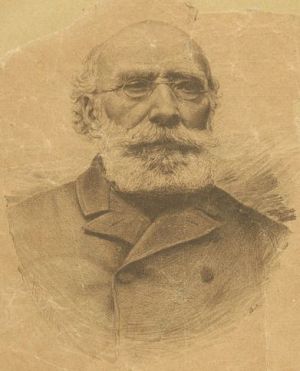Antoine Béchamp
Antoine Béchamp (1816–1908) was a French scientist whose work lies at the foundation of several branches of biology and pharmacy. Despite his significant contributions to science, Béchamp is often overshadowed by his contemporary, Louis Pasteur, with whom he had a longstanding rivalry. Béchamp's research focused on the chemical processes in living organisms, particularly fermentation, and he was a proponent of the cellular theory and the microzyma theory.
Early Life and Education[edit | edit source]
Antoine Béchamp was born on October 16, 1816, in Bassing, France. He pursued his higher education in the fields of science, earning degrees in the sciences and pharmacy. His early work was in the areas of chemistry and pharmacy, where he made significant contributions to our understanding of the chemical processes involved in life.
Career and Research[edit | edit source]
Throughout his career, Béchamp developed several theories that were revolutionary for his time. One of his most notable contributions was the discovery of the role of enzymes in fermentation. He argued that fermentation was a biological process carried out by living organisms, which he called microzymas. These microzymas, according to Béchamp, were capable of initiating fermentation outside of the living body, a theory that contradicted the prevailing germ theory of disease proposed by Pasteur.
Béchamp's work extended beyond fermentation. He was deeply involved in studying the chemistry of living organisms, particularly the role of alkalinity and acidity in health and disease. He believed that the body's ability to maintain a healthy alkaline state was crucial in preventing disease, a concept that has influenced modern alternative medicine practices.
Controversy and Rivalry with Pasteur[edit | edit source]
The scientific rivalry between Béchamp and Pasteur was one of the most notable in the history of science. While Pasteur's germ theory of disease gained widespread acceptance, Béchamp's microzyma theory did not achieve the same level of recognition. Béchamp criticized Pasteur's work, arguing that germs were not the cause of disease but rather a symptom of the diseased state of the body. This fundamental disagreement led to a series of debates and controversies between the two scientists that lasted for many years.
Legacy[edit | edit source]
Despite the controversy surrounding his work during his lifetime, Béchamp's contributions to science have been reevaluated in recent years. His work on the chemical processes of life and the importance of enzymes in biological reactions has been recognized as foundational in the fields of biochemistry and cellular biology. However, his theories on microzymas and the cause of disease have not been widely accepted by the scientific community.
Death[edit | edit source]
Antoine Béchamp passed away on April 15, 1908. His work, though not as celebrated as that of Pasteur, remains a significant part of the history of science, offering an alternative perspective on the nature of life and disease.
Search WikiMD
Ad.Tired of being Overweight? Try W8MD's NYC physician weight loss.
Semaglutide (Ozempic / Wegovy and Tirzepatide (Mounjaro / Zepbound) available. Call 718 946 5500.
Advertise on WikiMD
|
WikiMD's Wellness Encyclopedia |
| Let Food Be Thy Medicine Medicine Thy Food - Hippocrates |
Translate this page: - East Asian
中文,
日本,
한국어,
South Asian
हिन्दी,
தமிழ்,
తెలుగు,
Urdu,
ಕನ್ನಡ,
Southeast Asian
Indonesian,
Vietnamese,
Thai,
မြန်မာဘာသာ,
বাংলা
European
español,
Deutsch,
français,
Greek,
português do Brasil,
polski,
română,
русский,
Nederlands,
norsk,
svenska,
suomi,
Italian
Middle Eastern & African
عربى,
Turkish,
Persian,
Hebrew,
Afrikaans,
isiZulu,
Kiswahili,
Other
Bulgarian,
Hungarian,
Czech,
Swedish,
മലയാളം,
मराठी,
ਪੰਜਾਬੀ,
ગુજરાતી,
Portuguese,
Ukrainian
Medical Disclaimer: WikiMD is not a substitute for professional medical advice. The information on WikiMD is provided as an information resource only, may be incorrect, outdated or misleading, and is not to be used or relied on for any diagnostic or treatment purposes. Please consult your health care provider before making any healthcare decisions or for guidance about a specific medical condition. WikiMD expressly disclaims responsibility, and shall have no liability, for any damages, loss, injury, or liability whatsoever suffered as a result of your reliance on the information contained in this site. By visiting this site you agree to the foregoing terms and conditions, which may from time to time be changed or supplemented by WikiMD. If you do not agree to the foregoing terms and conditions, you should not enter or use this site. See full disclaimer.
Credits:Most images are courtesy of Wikimedia commons, and templates, categories Wikipedia, licensed under CC BY SA or similar.
Contributors: Prab R. Tumpati, MD

